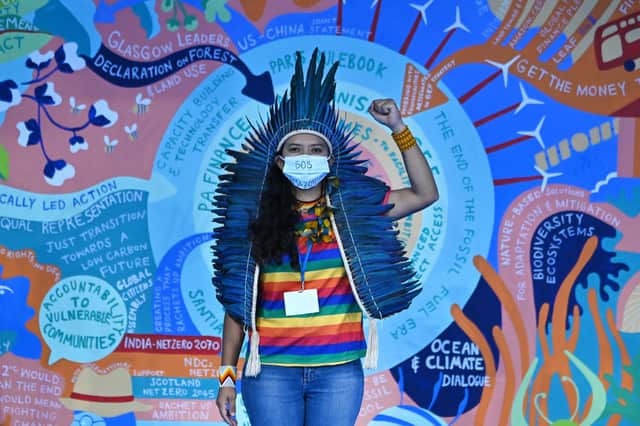COP26: What has been agreed so far as negotiations continue into weekend?


The United Nations summit, considered the most important since the Paris Agreement was set out in 2015, was officially due to end at 6pm yesterday.
But work to get a deal will now continue into the weekend.
A new draft COP26 text will be released today, which it is hoped will form the foundation of an agreement at the end of the conference, signed by all the countries attending.
Advertisement
Hide AdAdvertisement
Hide AdThe document, the second since the initial draft earlier this week, will be released at 8am.
The previous drafts have received mixed reactions, with many critics saying the plan has failed to seriously address the major polluters driving the environmental crisis, particularly with regard to fossil fuels.
WHAT’S THE PROBLEM?
International scientists have agreed that allowing global temperature to rise 2C above pre-industrial levels will lead to catastrophic and irreversible changes in the Earth’s climate system.
But they say limiting warming to 1.5C by the end of the century could protect the planet from the most cataclysmic effects – a key goal of the Paris Agreement, signed by nearly 200 countries.
WHAT CAN WE DO ABOUT IT?
To stay on track for the 1.5C goal requires slashing emissions of greenhouse gases, which cause warming, by 45 per cent by 2030 and to zero overall by 2050.
The world has already warmed by at least 1.1C, and projections suggest that current policies in place put the world on track to hit 2.7C by 2100.
The stated aims of COP26 are to: secure global net zero by mid-century and keep 1.5 degrees within reach; adapt to protect communities and natural habitats; mobilise finance; and work together to deliver the measures.
To achieve these ambitions requires acceleration of action to reduce emissions, strengthening adaptation and resilience to climate impacts and scaling up finance and support.
PROGRESS SO FAR
Advertisement
Hide AdAdvertisement
Hide AdProgress so far includes a deal on reducing emissions of methane, a short-lived but potent greenhouse gas, with more than 100 countries agreeing to cuts of 30 per cent from current levels by 2030. But China, Russia and India – some of the biggest emitters – have not signed up.
There was also an agreement from countries holding around 85 per cent of the world's woodland cover to end deforestation by 2030.
On coal, the single largest source of emissions, there have been some steps forward, with major users such as Poland, Chile and Vietnam among 40 countries which have agreed to phase out its use.
However, Australia, India, China and the United States, which rely heavily on coal power, have not joined up.
Finance is another key discussion point at COP26, with the 2020 deadline for rich countries to provide $100 billion in support for developing nations to help them deal with the impacts of increasingly severe weather and rising sea levels alreadymissed.
In Glasgow some 450 financial organisations, with around $130 trillion at their disposal, agreed to back low-carbon technology such as renewable energy, and move money away from industries reliant on fossil fuels.
COP26 SET OUT TO ‘KEEP 1.5 ALIVE’ – HAS IT?
UN chief António Guterres attempted to rally action in his address to delegates on Thursday.
"We cannot settle for the lowest common denominator,” he said.
“We know what must be done."
Advertisement
Hide AdAdvertisement
Hide AdBut 24 hours later Mr Guterres was not so optimistic, saying that COP26 would probably fail to achieve its aims and the goal to restrict global warming to 1.5C was on “life support”.
But he said hope remained “until the last moment”, which is right about now.
The latest amendments to the COP26 draft text have strengthened action in some areas but watered down requirements in others.
The first mention of fossil fuels in a UN climate deal since the 1997 Kyoto Protocol has stayed in place in the Glasgow text, as have rapid timelines on new plans and revised commitments to action in the 2020s.
However, yesterday’s iteration included the caveat “unabated” when referring to moves to phase out coal, meaning it can be burned if carbon capture techniques are used alongside.
WHAT’S STILL TO BE AGREED?
Consensus on new climate finance is thought to be one of the main sticking points.
Battles over loss and damage, carbon markets and investments were still raging at close of play.
Despite having no place at the COP26 negotiating table, Scotland received praise after First MInister Nicola Sturgeon pledged a further £12 million – on top of £24 million set aside – to support developingnations.
Advertisement
Hide AdAdvertisement
Hide AdShe called on larger countries with bigger resources to recognise their “moral responsibility” and adopt a “can-do” attitude to secure a successful outcome at COP26.
“It is clear that fair climate finance is the key to making real progress at COP26,” she said.
“It is time for leaders of developed countries, large and small, to do what is needed to bridge the remaining gap, and put on the table now the money that is needed to make good on past commitments and unlock progress in other areas.”